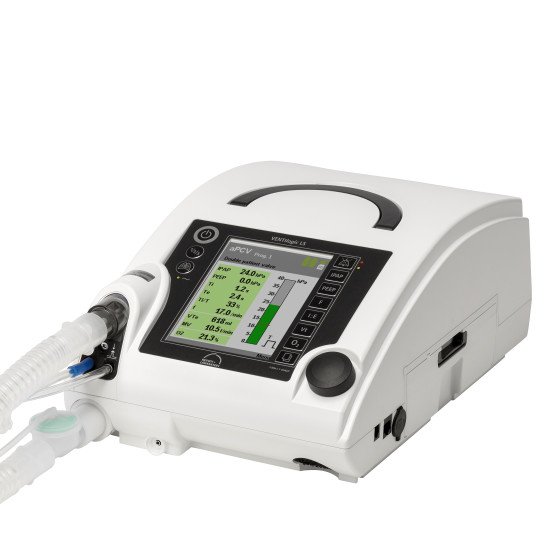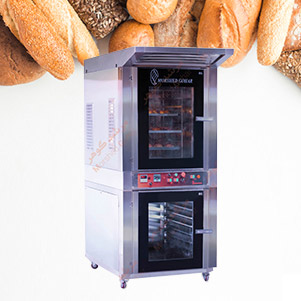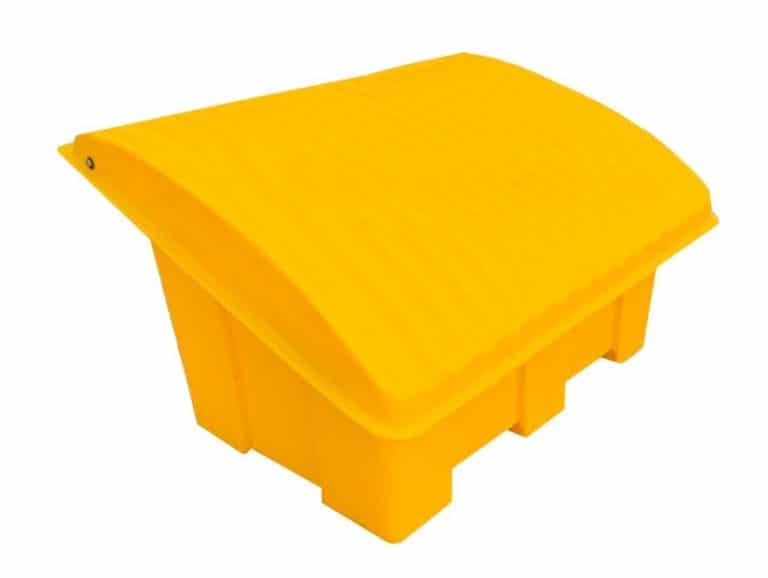
- تعداد بازدید : ۳۲۱ بار
۱۰۰ % Mobility and Reliability in IV and NIV
VENTIlogic LS and VENTIlogic plus are the forerunners in the new generation of ventilators. They offer you a high degree of reliability and versatility every day at all times. Their practice-oriented monitoring and mobility concepts are supplemented by unique ventilation functions.
VENTIlogic LS and VENTIlogic plus have leakage and single patient circuits. In addition VENTIlogic LS offers a double patient circuit system with patient valve and volume-controlled ventilation modes (VCV, aVCV).
Areas of Use
for treatment of adults and children starting with ۵۰ ml tidal volume and ۵ kg body weight
invasive and non-invasive ventilation
in hospital and at home
stationary and mobile
Our monitoring concept ensures safe and reliable therapy
You can rely on our new monitoring concept for VENTIlogic LS and VENTIlogic plus. Extensive and comprehensive, it provides ideal support of your treatment:
intuitive operation for fast check of ventilation settings
unique alarm management (highly visible, large alarm window) for top safety: You can concentrate completely on therapy without any stress.
WEINMANNsupport:
trend analysis and expanded storage function for therapy with help of SD card
complete recording of course of ventilation treatment
Our mobility concept assures more freedom
The mobility concept in VENTIlogic LS and VENTIlogic plus ensures safety and reliability in the delivery of required ventilation. That gives both you and your patients more freedom.
Mobile use for intra-hospital transfers: With eight hours of battery power (internal rechargeable battery and optional replaceable battery* each have four hours' operation), the devices can adapt to any change of location.
Mobile use at home: VENTIlogic LS and VENTIlogic plus give your patients freedom of movement.
Sure in an unsure situation: Leakage is reliably compensated for in volume and pressure controlled modes. The high-performance blower ensures continuous patient care in mobile use and difficult ventilation situations, even with imprecise fit of patient interface.
Special Shock Resistance
Shock and vibration resistance were specially tested against recognized standards to ensure device's compliance with demands in mobile hospital and domestic surroundings. (Shock test as per IEC ۶۰۰۶۸-۲-۲۷ and Vibration test as per IEC ۶۰۰۶۸-۲-۶۴).
* The operating range of the rechargeable battery depends on the settings of the ventilation parameters and on the battery's age and charge level. The internal battery may be used only as an emergency source of power and not as a continuous primary source.
The fast and simple way to ideal therapy settings - with innovative features by Weinmann
LIAM (Lung Insufflation Assist Maneuver): the integrated cough support is easy to use and requires no change of masks. The patient himself or a nurse can activate the function.
TA Mode (Timed adaptive): ideal adaptation of ventilation to the patient's breathing pattern effectively unloads the respiratory muscles. The adaptive algorithm increases patient comfort and simplifies the setting process for the doctor.
Volume compensation: Three different speed levels can be set for the automatic regulation to target volume. Through the selection of a speed level and pressure increase, the user can make the most precise setting to reach the target volume. When the pressure reaches a corridor around the target volume, the device automatically switches to precise regulation.
Particularly suitable for COPD patients
AirTrap Control: Exhalation pressure relief to prevent dynamic hyperinflation. Thanks to AirTrap Control, VENTllogic LS and VENTIlogic plus automatically regulate pressure to a frequency and expiration time ideal for the patient. The titration process is thereby significantly simplified.
Trigger lockout: effective protection from false triggering and trigger artefacts at higher trigger sensitivity. The fast way to perfectly synchronized ventilation.
Expiratory pressure ramp: temporary pneumatic splint in airways at the start of expiration to counteract expiratory collapse of airways. The expiratory flow remains larger on average, the volume can be exhaled more easily and respiratory position can be lowered.
مشخصات اطلاعات شرکت فروشنده این محصول
۱۰۰ % Mobility and Reliability in IV and NIV
VENTIlogic LS and VENTIlogic plus are the forerunners in the new generation of ventilators. They offer you a high degree of reliability and versatility every day at all times. Their practice-oriented monitoring and mobility concepts are supplemented by unique ventilation functions.
VENTIlogic LS and VENTIlogic plus have leakage and single patient circuits. In addition VENTIlogic LS offers a double patient circuit system with patient valve and volume-controlled ventilation modes (VCV, aVCV).
Areas of Use
for treatment of adults and children starting with ۵۰ ml tidal volume and ۵ kg body weight
invasive and non-invasive ventilation
in hospital and at home
stationary and mobile
Our monitoring concept ensures safe and reliable therapy
You can rely on our new monitoring concept for VENTIlogic LS and VENTIlogic plus. Extensive and comprehensive, it provides ideal support of your treatment:
intuitive operation for fast check of ventilation settings
unique alarm management (highly visible, large alarm window) for top safety: You can concentrate completely on therapy without any stress.
WEINMANNsupport:
trend analysis and expanded storage function for therapy with help of SD card
complete recording of course of ventilation treatment
Our mobility concept assures more freedom
The mobility concept in VENTIlogic LS and VENTIlogic plus ensures safety and reliability in the delivery of required ventilation. That gives both you and your patients more freedom.
Mobile use for intra-hospital transfers: With eight hours of battery power (internal rechargeable battery and optional replaceable battery* each have four hours' operation), the devices can adapt to any change of location.
Mobile use at home: VENTIlogic LS and VENTIlogic plus give your patients freedom of movement.
Sure in an unsure situation: Leakage is reliably compensated for in volume and pressure controlled modes. The high-performance blower ensures continuous patient care in mobile use and difficult ventilation situations, even with imprecise fit of patient interface.
Special Shock Resistance
Shock and vibration resistance were specially tested against recognized standards to ensure device's compliance with demands in mobile hospital and domestic surroundings. (Shock test as per IEC ۶۰۰۶۸-۲-۲۷ and Vibration test as per IEC ۶۰۰۶۸-۲-۶۴).
* The operating range of the rechargeable battery depends on the settings of the ventilation parameters and on the battery's age and charge level. The internal battery may be used only as an emergency source of power and not as a continuous primary source.
The fast and simple way to ideal therapy settings - with innovative features by Weinmann
LIAM (Lung Insufflation Assist Maneuver): the integrated cough support is easy to use and requires no change of masks. The patient himself or a nurse can activate the function.
TA Mode (Timed adaptive): ideal adaptation of ventilation to the patient's breathing pattern effectively unloads the respiratory muscles. The adaptive algorithm increases patient comfort and simplifies the setting process for the doctor.
Volume compensation: Three different speed levels can be set for the automatic regulation to target volume. Through the selection of a speed level and pressure increase, the user can make the most precise setting to reach the target volume. When the pressure reaches a corridor around the target volume, the device automatically switches to precise regulation.
Particularly suitable for COPD patients
AirTrap Control: Exhalation pressure relief to prevent dynamic hyperinflation. Thanks to AirTrap Control, VENTllogic LS and VENTIlogic plus automatically regulate pressure to a frequency and expiration time ideal for the patient. The titration process is thereby significantly simplified.
Trigger lockout: effective protection from false triggering and trigger artefacts at higher trigger sensitivity. The fast way to perfectly synchronized ventilation.
Expiratory pressure ramp: temporary pneumatic splint in airways at the start of expiration to counteract expiratory collapse of airways. The expiratory flow remains larger on average, the volume can be exhaled more easily and respiratory position can be lowered.
مشخصات اطلاعات شرکت فروشنده این محصول














